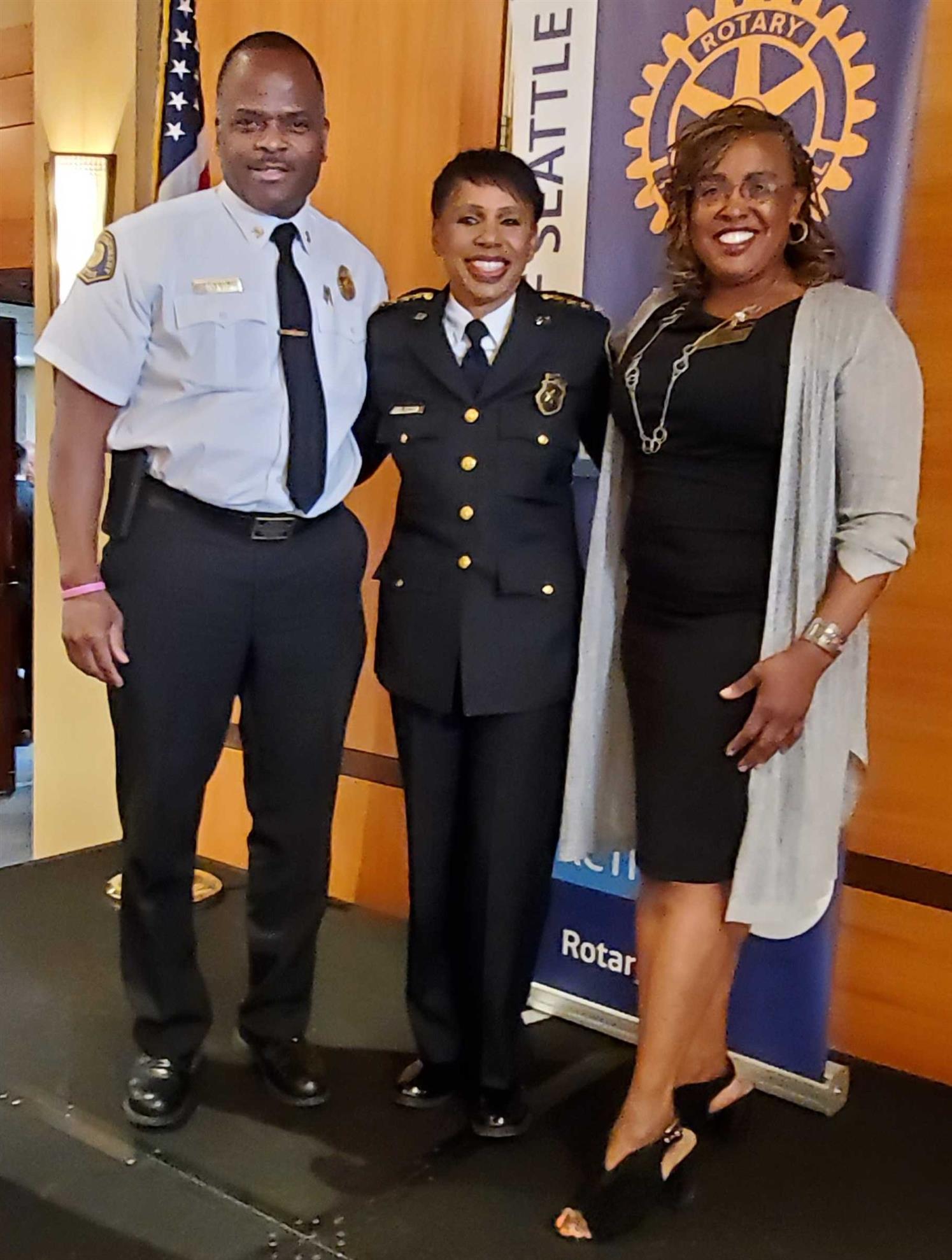
On National Coffee with a Cop Day, we upped the game by having Lunch with a Police Chief. Seattle Police Department Chief, Carmen Best, was our guest speaker who candidly shared the joys and concerns of being Police Chief in a major U.S. city. A 28 year Seattle Police Department (SPD) veteran, Chief Best opined that the two most important qualities to make a good officer are hard work (“100% work 100% of the time”) and an innate commitment to serve. The Chief explained that many calls are, at the core, officers responding to people in need. Officers provide services to those experiencing domestic violence, addiction, sexual assaults and homelessness. She acknowledged there are times when the job entails arrests or dangerous situations but, more often, the job requires helping the community. She said being an officer is more than a job, it's really a calling.
Throughout her talk she referenced the need to study and know various aspects of criminology, the department policies, and the data underlying the priorities and policies. The primary goal of her strategic plan is to “Reduce Crime and Disorder in Seattle” with the purpose of making the city better and safer for everyone. Following that, is providing “Excellence in Service.” The Chief's philosophy is that SPD works for, and receives its authority from, the people of Seattle. Therefore, it has a duty to provide superb service and to show respect to the people. Doing so includes being efficient, being professional, and spending the city's money in a fiscally responsible manner.
The Chief touched on the seven years of significant oversight following the Federal Consent Decree from the federal monitor, the federal judge (Judge James L. Robart who spoke here last year), the Office of Professional Accountability, the Police Commission, and the Department of Justice. She said the department was focused on achieving every metric required and expressed her belief that the oversight would end in the near future. She affirmed the need for police to be accountable to the community.
Her most difficult issues involve addressing the serious opioid and methamphetamine addicted portion of our population and the crimes and disorders stemming from them as well as the chronic struggle in recruiting, hiring and retaining fine officers. Officers with three to six years of experience are the mostly likely to leave. Chief Best says she advises them that they are welcome to return to SPD if they find the grass less green than expected. She explained that retention is a problem faced by many large cities.
SPD's role as part of the Navigation Team designed to address homelessess was discussed. Of course, solving homelessess is a problem we all share, not just the police, and the homeless include those who are addicted, criminal or have mental health issues. (All SPD officers receive training to deal with people in crisis and those with mental health issues). Twelve police officers are assigned full time to the Navigation Team which also includes social workers and mental health professionals. The mayor's budget proposes additional money for the Navigation Team including four more mental health professionals and 18 Community Service Officers.
Some other data provided by the Chief:
- The city received 15,995 calls solely for mental health services in 2018;
- The North Precinct encompasses 400,000 people which, if a city, would be the second largest in our state;
- The police department received 67,000 calls last month;
- The volume explains why responding to a "crime in progress" call, particularly if the reported crime is violent, takes precedence over stale crimes or victimless ones;
- There was an 8% reduction in crime last year;
- SPD seized 1,400 guns illegally held or used in crimes last year.
Chief Best touted the good work of the Police Foundation, several members of which attended our meeting. Fire Chief Harold Scoggins introduced Chief Best and announced that she's completed her Seattle 4 application. The crowd roared.
President Kim opened the meeting by welcoming visiting Rotarians and others, followed by Trish Bostrom and her banjo leading us in God Bless America. Jane Tornatore's inspiration was a thoughtful reflection on what it takes to be a good police officer and concluded with a call for officers to perform their jobs with compassion and grace. Chief Best referred to Jane's inspiration during her presentation.
President Kim called for a moment of silence to remember former member John Blackman who passed away this week.
Ken Colling, chair of the Nominating Committee, asked interested members to please self-nominate! The Committee wants to hear from you if you want to be in the club or SRSF leadership.
This week also begins our annual Seattle Rotary Service Foundation (SRSF) and The Rotary International fundraising. Trish Bostrom, SRSF president, introduced Tom Mesaros who gave a rousing pitch for 100% club participation to meet our goal of $225.000. Kick starting the donations, the entire club and SRSF leadership has pledged. This year, members have the option of dividing a $1,000 Pinkham and Skeel or $2,500 President's Circle donation into three payments. Please donate soon!
For pictures of this week's meeting, check out the club's Facebook Page featured in the Totem newsletter.

